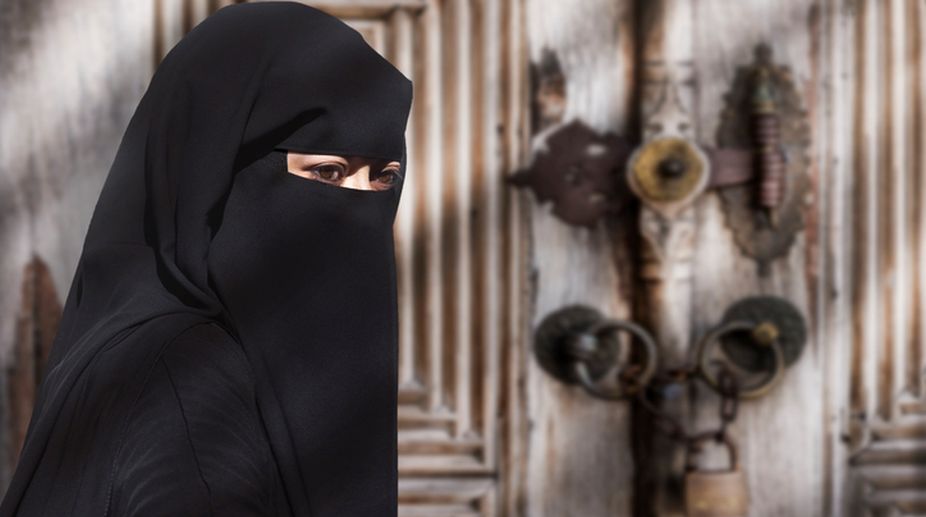10 Pakistanis dead, 36 rescued in boat capsize tragedy near Morocco
At least 10 Pakistanis have died in another tragic incident when a boat carrying at least 80 passengers capsized near Morocco.

Representational image (Photo: Getty Images)
Last week, officials from Morocco’s interior ministry took to the markets. There they visited some merchants and handed them a letter. “We notice that you sell the burqa,” the letter noted, before asking the merchants to get rid of the existing stock within 48 hours and to not sell it in future.
The ban on the sale and manufacture does not apply to the headscarf or hijab or even to the niqab, which covers half a woman’s face leaving the eyes exposed. It only applies to the full burqa that covers the entire face and permits vision through a mesh at the front.
Advertisement
The new restrictions were touted as part of Morocco’s fight against religious extremism, noting that while the hijab is common in the country, the full burqa was the import of extremist religious groups whose activities the Moroccan government was trying to curb.
Advertisement
The ban in Morocco is one of the first to be enforced in a Muslim country in recent history. Last March, the Egyptian parliament debated a similar ban on burqas in Egypt. Proponents of the ban, such as MP Amna Nosseir, said that there was no evidence that the full burqa was even an Islamic practice, let alone required by Islam. She located the origin of the practice in a Jewish tradition that was practised in the Arabian peninsula prior to the advent of Islam. Islam, she noted, required modesty and not items like the full burqa that occlude identification.
It should be noted that the Egyptian authorities have already banned the niqab in certain places. Doctors and nurses in Cairo University are not permitted to wear the niqab and members of the faculty have also been advised not to wear it.
The bans on these various kinds of face coverings raise some important questions. As is well known, the burqa is already banned in several Western nations. In Germany, Chancellor Angela Merkel exhorted female German Muslims who wear the full face veil to “Show your face. The full face covering is not permissible and should be banned.”
France was the first to ban the burqa, passing legislation in 2011 that would prevent women from wearing it in public spaces. The ban was challenged in the European Court of Human Rights and was upheld in 2014. Belgium followed the French example not long after and passed legislation banning the burqa. Similar bans are in place in the Netherlands, whose parliament declared that the full face had to be seen in the interest of public safety. Bulgaria, parts of Italy and Switzerland have also banned the burqa from being worn in public spaces.
The actions taken by the Moroccan government raise some interesting questions regarding the limits of state power and the status of the full-face veil or burqa. In the European countries where the burqa has been banned, those opposing the ban have pointed out how the practice is an example of coercive state power towards the minority Muslim women.
Since most (but not all) the countries that have banned the burqa are colonial powers, the argument that the clothing ban is a revitalisation of systems of colonial control are often made against them. The fact that the burqa ban lists security imperatives, particularly the prevention of terror attacks, as its motivation is vulnerable to criticism in that it singles out Muslims and Muslim attire as an iteration of possible, even probable, terrorist intent. In these countries, this criticism argues, women who wear the full burqa have all been branded as possible terrorists, a label that is asserted as the true intent behind the burqa ban. It would be difficult to superimpose all these arguments on post-colonial contexts. It is not that Muslim nations have no history of banning various modes of clothing; Turkey’s ban on headscarves (not burqas) was only recently overturned by the Erdogan government. Beyond that example, however, it is difficult to hold that governments of Muslim countries are trying to isolate and malign women who wear the full burqa.
One crucial impediment in doing so is the fact that these same governments, run almost entirely by Muslims, do many other things to promote the faith. If extremist interpretations that insist on the burqa as a religious requirement can promote and propagate their position, shouldn’t the government or elected representatives of Muslim countries be similarly permitted to purport their opposition to certain interpretations? In the battle over who gets to define Islam, why should the moderates remain silent?
The same questions can be asked in Pakistan, where unlike in Morocco, many women do wear the burqa. Several more, including those working as teachers, doctors and nurses, wear the niqab, which while not a full face covering also obscures their identity. The question of the burden this imposes on the rest of the Pakistanis, who must accept instruction, medical treatment, banking services, etc, from someone they cannot see is not one that has been debated with any depth or detail. The security concerns that have been enumerated by the Moroccan government could be said to apply to Pakistan as well.
The hardest dilemma confronting countries like Morocco that are moving to ban the burqa is whether they are using coercive state power to abridge women’s choices. The particular poison of bans is that they end up valorising the very practices that they seek to outlaw, their forbidden nature making the practice heroic. So it may be in the case of the burqa ban in Morocco, where the popularity of the burqa increases rather than decreases. It is too soon to answer the question, but it may be a good time to pose it, all over the Muslim world.
Advertisement